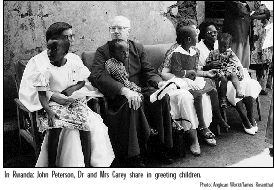|
Rwanda rises from the ashes of war by Jane Gitau
His story is shocking. He was reported by both the Church and the press as having been killed when he disappeared for three months at the height of the war that saw brother turn against brother and parents against their children. Then he resurfaced miraculously in Nairobi, from where he laid down plans for postwar Rwanda. It was then that he mooted the idea of Barakabaho children's homes. The 35 workers at Barakabaho help link the orphans to foster families. Normally, the family consists of an adult widow and any of her surviving children or relatives. Adoption is cheap, cultural, and provides a sense of belonging. The family can help in long-term planning for this child. More than half a million of Rwanda's eight million people are orphans. They need food, clothing, shelter and school fees. So, too, do they have emotional and psychological needs. Yet only a thousand of these have been linked up with foster families. ``We need to give them a sense of hope and the love of God,'' says the Archbishop of Rwanda, Congolese-born Emmanuel Kolini. ``We were responsible when their parents and loved ones were killed. Other countries sold to us their guns for the genocide. How do we explain that God is the same yesterday, today and forever? None of us is innocent.'' A product of the East African revival,Archbishop Kolini became a born-again Christian in 1965 while he was headmaster of a primary school he had founded in a refugee camp in Western Uganda. He has experienced suffering and misery as a refugee. Born 54 years ago, he fled to Uganda during the 1964 civil war and lived there for 15 years. For eight years, he was a parish priest. After the genocide the Church in Rwanda had no leaders. There was a clash of ideas on the Church that would rebuild this Central African country. Some clergy had been accused of advancing the hostilities. The Archbishop of Canterbury had to step in to identify and put in place a new crop of leadership. ``After you have been ill there is a period of convalescence. You don't just wake up and go to play football,'' Bishop Bilindabagabo says metaphorically of the Church in his land. The Church has regained its credibility and can now speak about justice and reconciliation. Archbishop Kolini went to Rwanda from the Congo in 1997 to help rebuild a Church where Christians had shared the body and blood of Christ in Holy Communion, then killed each other; where it seemed the blood of tribalism had become more important than the blood of Christ. He now wonders what Christianity meant to his countrymen, and where the seed of Christianity fell.``I need to understand where my predecessors went wrong so I don't repeat the same mistakes.'' His greatest task is reconciliation. Some may seek revenge, others live in guilt, and still others fear that those who killed may do it again. Reconciliation involves trust and fear. ``How do you build up trust among people who intentionally hated each other?'' Archbishop Kolini asks. ``I have visited mass graves where thousands and thousands of skeletons are lying in churches. ``You have to help them to know they are both Christians and Rwandans and created in the image of God,'' he says. Archbishop Kolini returned to the Congo in1980 after a 15-year absence and within eight months was appointed Assistant Bishop of Bukavu Diocese, within which Katanga fell. Bukavu was half of the entire size of Zaire and the diocesan bishop had been elected archbishop.Within a short time, 6,000 people became Anglicans in Katanga Province but the diocesan office was 2,000 miles away, necessitating the appointment of an assistant bishop. For Rwanda, the question of international debt is a real issue. It means that a country emerging from war already owing money must repay its dues, at the same time borrowing more for reconstruction. It also means less is available for school fees and looking after the orphans and widows. For Archbishop Kolini the task now is to get to know his priests and bishops better and then to create boards for social ministry that bring both clergy and laity together to articulate their vision of a new Rwanda. Front page of this issue |

 ``If we don't face squarely
the problem of the orphans, we have no future,'' says Bishop Alexis Bilindabagabo
(Gahini, Rwanda). And he should know. Having set up the first adoption centre after
the genocide that saw more than a million people slaughtered in his country four
years ago, he has now joined hands with the current leadership of the Church to rebuild
the nation.
``If we don't face squarely
the problem of the orphans, we have no future,'' says Bishop Alexis Bilindabagabo
(Gahini, Rwanda). And he should know. Having set up the first adoption centre after
the genocide that saw more than a million people slaughtered in his country four
years ago, he has now joined hands with the current leadership of the Church to rebuild
the nation.